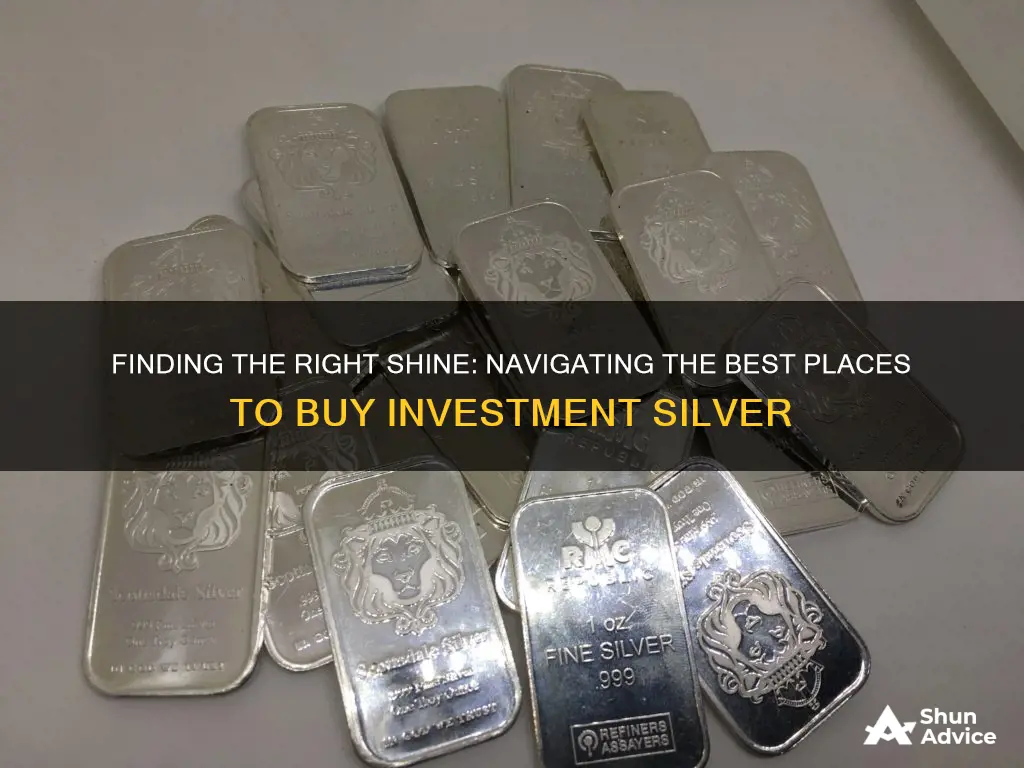
Silver is a popular investment choice for those seeking an alternative to traditional stocks and bonds, particularly during economic uncertainty and high inflation. There are several ways to invest in silver, each with its own advantages and drawbacks.
One way to invest in silver is to own it directly, either as coins, bullion, or bars. This method offers investors the psychological satisfaction of physically possessing the metal. Silver coins are legal tender, government-backed, and easier to liquidate than bars, but they also tend to be more expensive. On the other hand, bars are a good option for those seeking to invest in larger quantities of silver. Local dealerships, pawn shops, and online dealers such as APMEX and JM Bullion are some places where physical silver can be purchased.
For those who want exposure to silver without the hassle of storing and securing physical metal, investing in silver-focused equities is another option. This can be done by purchasing shares of exchange-traded funds (ETFs) that track the price of silver, such as ProShares Ultra Silver (AGQ) and iShares Silver Trust (SLV). ETFs offer a lower-cost way to invest in silver, with annual management fees typically ranging from 0.1% to 0.2%.
Another way to invest indirectly in silver is by buying shares of companies involved in the production and distribution of the metal, such as silver mining companies. This approach allows investors to benefit from both increases in the market price of silver and the company's operational success. Examples of silver mining companies include Endeavour Silver Corp. (EXK) and First Majestic Silver Corp (FR).
Ultimately, the best way to buy investment silver depends on an investor's goals, risk tolerance, and investment strategy.
| Characteristics | Values |
|---|---|
| Reasons to invest in silver | Silver is a tangible asset with intrinsic value and no default or counter-party risk. It is a good conductor of electricity and is used in batteries, electric contacts, dental alloys, medical equipment, and more. It is also a crucial industrial commodity. |
| Where to buy silver | Local dealerships or pawn shops, online dealers such as APMEX or JM Bullion, specialised dealers, banks (rare), or your local coin shop |
| Types of silver investment | Direct ownership of physical silver, exchange-traded funds (ETFs), closed-end trusts, stocks with silver interests, silver options trading, silver futures or silver futures contracts, stocks of silver mining companies |
What You'll Learn

Silver bars vs coins
Silver bars and coins are both good options for diversifying your investment portfolio and growing your wealth over time. However, there are some key differences to consider when deciding between the two.
Silver Coins
Silver coins are legal tender and are backed by a government guarantee, making them easily recognisable and more liquid than silver bars. The issuing government guarantees their weight and purity, and they are valued for their precious metal content. They typically weigh around one ounce, but some can weigh as little as one-tenth of a troy ounce. They are also smaller than bars, making them easier to transport and store.
Silver coins can be further categorised into numismatic and bullion coins. Numismatic coins are rare, old, and have historical value. They are valued based on their rarity, condition, and origin, in addition to their melt-down value. On the other hand, bullion coins are manufactured year-to-year and are considered a form of currency with a defined value. Examples of bullion coins include Canadian Silver Maples and South African Krugerrands.
Silver Bars
Silver bars are rectangular slabs produced by private mints and are not considered legal tender. They are valued solely for their bullion quality and are compact, stackable, and easy to store. They are also cheaper than silver coins due to their lower production costs. Silver bars are ideal for larger investors making significant investments of thousands of dollars.
The choice between silver bars and coins depends on your investment goals and personality as an investor. If you are a smaller investor with a tight budget, silver coins might be a better option due to their high liquidity and government backing. On the other hand, if you are a larger investor looking for a more affordable option with greater monetary value, silver bars may be more suitable.
Home-Buying: Navigating the Complex World of Property Investment
You may want to see also

Online vs in-store
There are several options for purchasing silver, from owning it directly to purchasing shares in companies that produce it. While some investors prefer to buy silver in person, others opt for online dealers. Here are some considerations for buying silver online versus in-store.
Online
Buying silver online can offer several benefits. Firstly, it is convenient and allows investors to compare prices and options from different dealers. Online dealers often have a wider selection of products, including coins, bars, and bullion. Additionally, online dealers may offer lower prices due to reduced overhead costs. For example, Money Metals Exchange offers competitive prices and free shipping on orders over $199.
Another advantage of buying silver online is the availability of buy-and-store programs. These programs allow investors to purchase silver without taking physical possession of it. The coins or bars are stored in an approved vault, ensuring their safety and eliminating the need for home safes or safety deposit boxes. Forbes recommends finding a dealer with a buy-and-store program to keep your investment secure.
However, buying silver online also has some potential drawbacks. One concern is the risk of counterparty fraud, as investors do not physically see or hold the silver before purchasing. Additionally, there may be delays in shipping and delivery, and investors may need to pay for shipping and insurance.
In-store
Purchasing silver in-store offers the advantage of seeing and inspecting the product before buying. Local dealerships or pawn shops may offer physical silver, and specialised dealers can provide larger quantities or alternative forms to coins. In-store purchases may also be quicker and more accessible for those who do not want to wait for shipping.
However, buying silver in-store may result in higher prices due to limited stock and higher overhead costs for dealers. The selection may also be more limited, and investors may need to visit multiple stores to find their desired products. Additionally, there is the risk of theft or loss when transporting the silver from the store to a secure location.
In conclusion, both online and in-store options have their advantages and disadvantages. Online purchases offer convenience, a wider selection, and the option of buy-and-store programs, while in-store purchases allow for physical inspection and immediate possession of the silver. Investors should carefully consider their priorities and preferences before deciding whether to buy silver online or in-store.
The Ethical Retirement Conundrum: Navigating a Moral Minefield
You may want to see also

Silver ETFs
There are several Silver ETFs available in the market, including the abrdn Physical Silver Shares ETF (SIVR), the iShares Silver Trust (SLV), and the Invesco DB Silver Fund (DBS). These ETFs are ranked according to their one-year trailing total returns, with SIVR being the best-performing option. Silver ETFs offer a cost-efficient investment management option with low expense ratios and the potential to deliver returns that outpace inflation.
When considering investing in Silver ETFs, it is important to conduct thorough research and consult with a financial advisor to ensure that the investment aligns with your objectives and risk tolerance.
A Smart Strategy: Investing $400,000 for Retirement
You may want to see also

Silver mining stocks
- First Majestic Silver (NYSE:AG): This company gets the majority of its revenue from silver, making it one of the purest plays on silver in the mining sector. They currently operate three mines in Mexico and have several other silver mines under development.
- Pan American Silver (NASDAQ:PAAS): This company controls the world's largest silver reserves and has a strong commitment to sustainability. They have a solid balance sheet and generate free cash flow, which they use to fund expansions and return cash to investors.
- Wheaton Precious Metals (NYSE:WPM): Wheaton is a precious metals streaming company, which means they provide cash to mining companies to cover development costs in exchange for the right to buy some of the produced metal at fixed prices. They have significant silver exposure and their business model allows them to profit from rising silver prices while assuming fewer risks associated with physical mining.
- IShares Silver Trust (NYSEMKT:SLV): This is an exchange-traded fund (ETF) that tracks the price of silver by owning physical silver bars stored in bank vaults. It offers investors a way to invest in silver without the hassles and risks associated with owning the physical metal.
- MAG Silver (NYSE:MAG): This company has operations in Mexico and is strategically positioning itself as a leading silver mining company. They have a strong financial performance and are expected to generate significant free cash flow in the future.
- Endeavour Silver (NYSE:EXK): Endeavour Silver has high-grade, underground silver-gold mines in Mexico and has been delivering strong financial results. They have a "Strong Buy" rating from analysts and are expected to have compelling upside potential.
- Hecla Mining Company (NYSE:HL): Hecla Mining is a sizeable American metals mining company with access to lucrative properties in Alaska. Their shares are rated as a "Buy" on average, and they have a potential upside to their share price.
- Fortuna Silver Mines (NYSE:FSM): This Canadian gold and silver mining company has operations in Peru, Mexico, and other countries. They have been delivering strong financial results and have a "Strong Buy" rating from analysts.
These are just a few examples of silver mining stocks that investors can consider. It is important to note that investing in silver stocks comes with risks, including volatility in the silver price and operational risks associated with mining.
The College Conundrum: Is Higher Education Worth the Investment?
You may want to see also

Silver options trading
Advantages of Silver Options Trading
- Silver options are a less capital-intensive way to invest in silver compared to buying physical silver or silver futures.
- Options allow traders to profit whether the price of silver rises or falls.
- Silver calls give the holder the right to buy silver in the future at a specified price, while puts give the right to sell.
- Options provide flexibility as it's not necessary to hold the option until expiry. Selling the put or call before expiry can lock in a profit or minimize a loss.
- Silver options are traded through the Chicago Mercantile Exchange (CME) and are cleared under the symbol SO.
- The value of silver options is tied to the price of silver futures, with various strike prices and expiry times to choose from.
Disadvantages and Risks of Silver Options Trading
- Silver options prices can be affected by "Greeks," variables that influence the option's price.
- The further the strike price deviates from the current silver price, the cheaper the premium but the lower the likelihood of profitability before expiry.
- Options trading requires a margin brokerage account, and there are associated commissions and costs.
- There is a risk of losing the premium paid for the option if the price of silver does not move as anticipated before the option expires.
- While options provide exposure to silver price movements, they do not provide ownership of the physical metal.
- Physical Silver: Buying physical silver, such as coins or bullion, provides psychological satisfaction and direct use of the metal. However, it can be challenging to store and insure, and there is a risk of overpaying or facing difficulties in selling it quickly.
- Silver Futures: Silver futures allow investors to wager on silver price movements without owning physical silver. They offer high leverage, but the risk of loss is also magnified.
- ETFs: Exchange-traded funds (ETFs) that own physical silver or silver futures provide a lower-risk method of investing in silver. They offer diversification, liquidity, and protection against theft. However, silver ETFs are subject to volatility and management fees.
- Silver Mining Stocks: Investing in silver mining companies offers exposure to the performance of the mining industry and the potential for increased profits as production rises. However, individual mining companies carry their own set of risks and require extensive analysis.
Choosing Where to Buy Silver
When deciding where to buy silver, investors should consider their personal preferences, the reputation of the seller, and the availability of features such as buy-and-store programs and competitive pricing. Online dealers often provide a wider selection and more convenient purchasing options, while local dealerships or pawn shops may be preferable for those who want to examine the silver in person.
Home Truths: Unraveling the Risks of Property Investment
You may want to see also
Frequently asked questions
Physical silver can be purchased online, through local dealerships or pawn shops, or from specialised dealers.
Forbes recommends buying silver online, as this allows investors to find a dealer with a buy-and-store programme, which means they don't have to take physical possession of their assets. Traditionalists, however, insist that the best place to get started is your local coin shop.
According to GOBankingRates, the best online retailers for buying silver include:
- Money Metals Exchange
- American Precious Metals Exchange (APMEX)
- JM Bullion
- Golden Eagle Coins
Buying physical silver gives you direct ownership of the precious metal. You can physically touch your investment and don't have to rely on an internet connection or third party to manage your silver.







